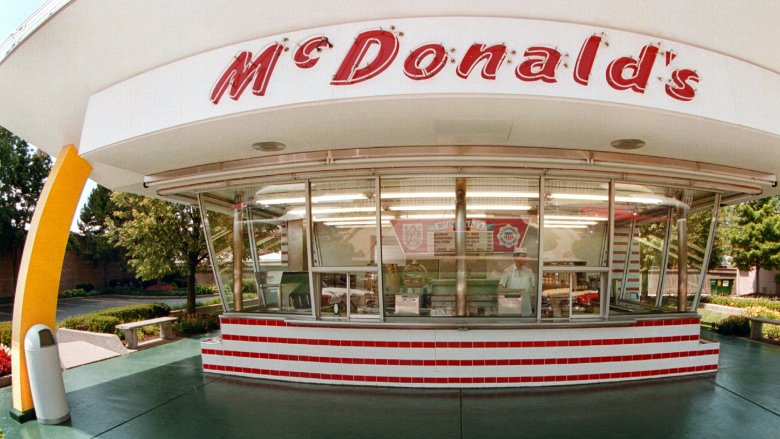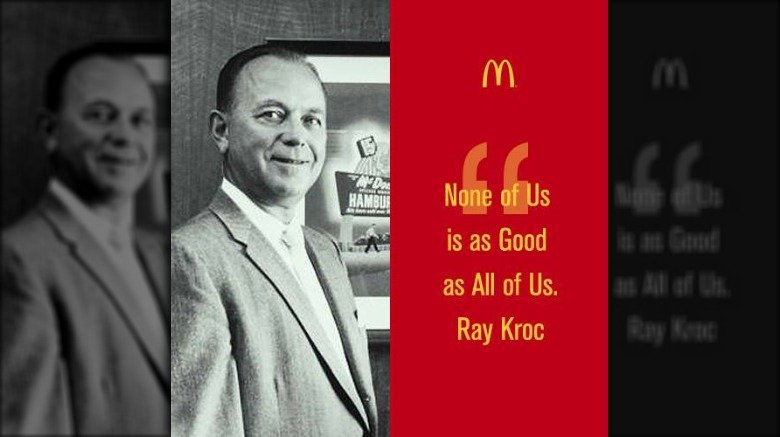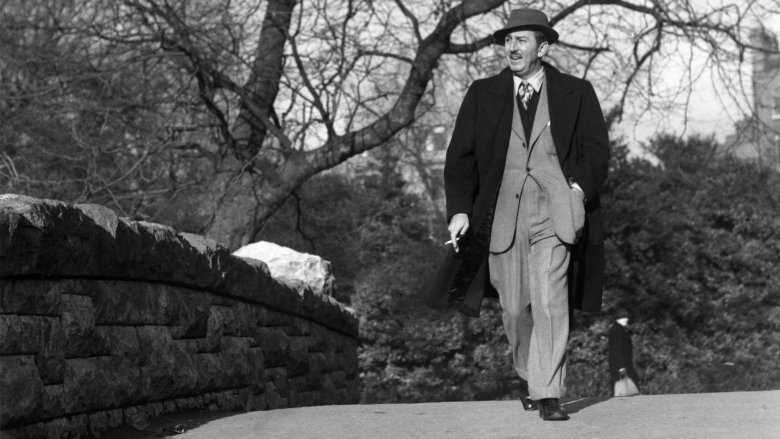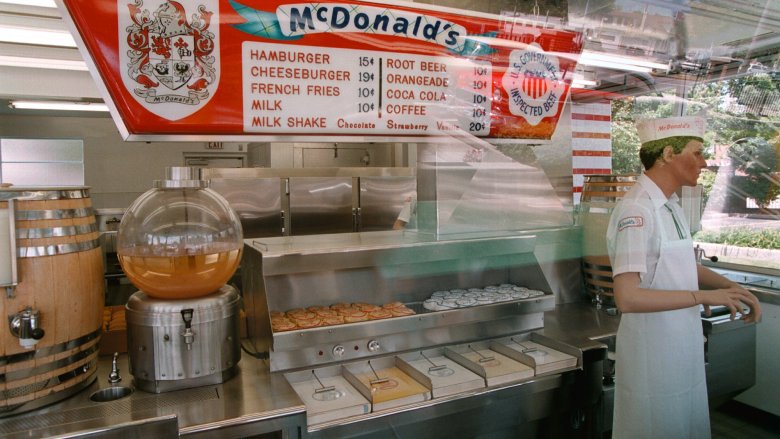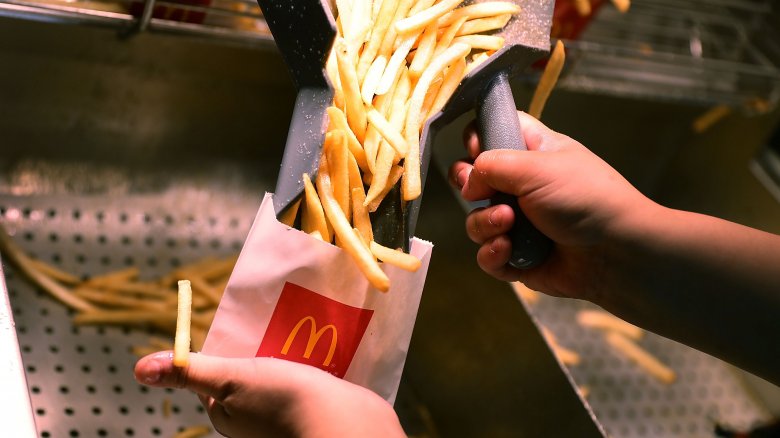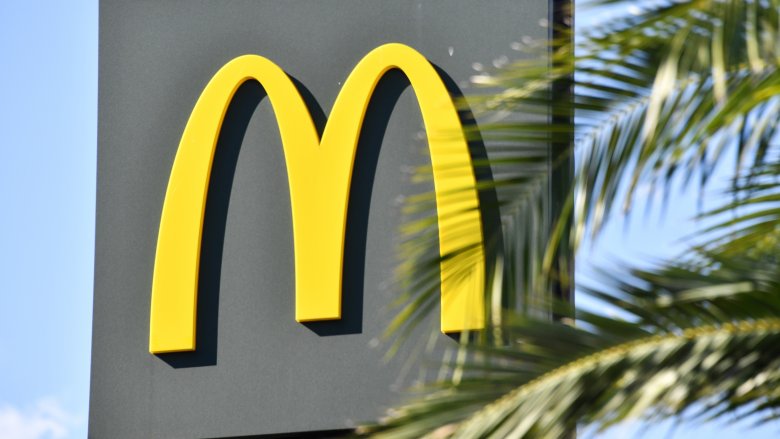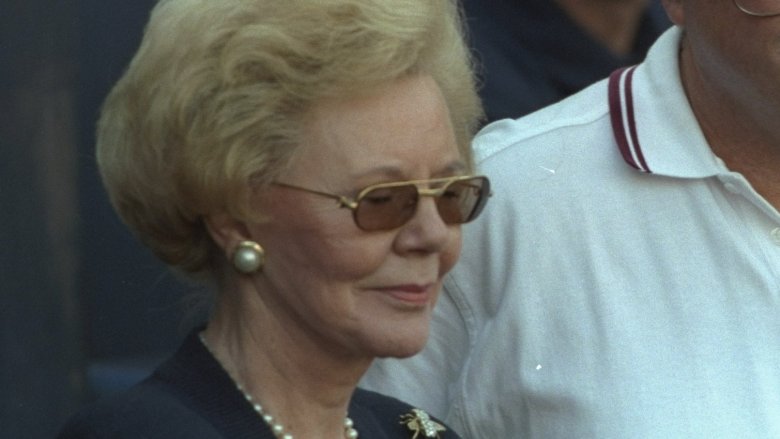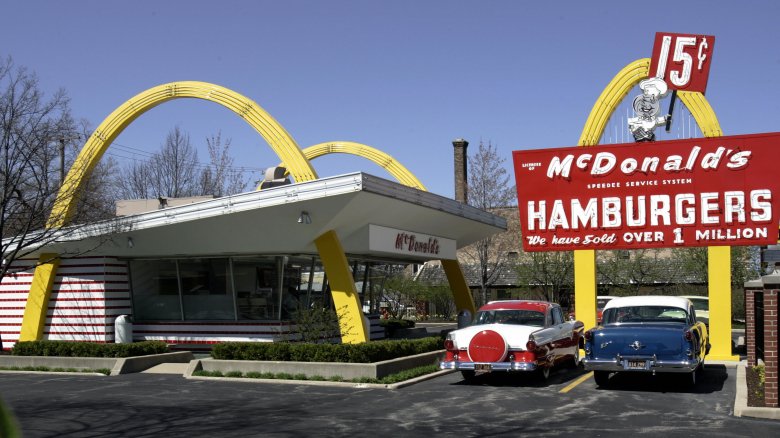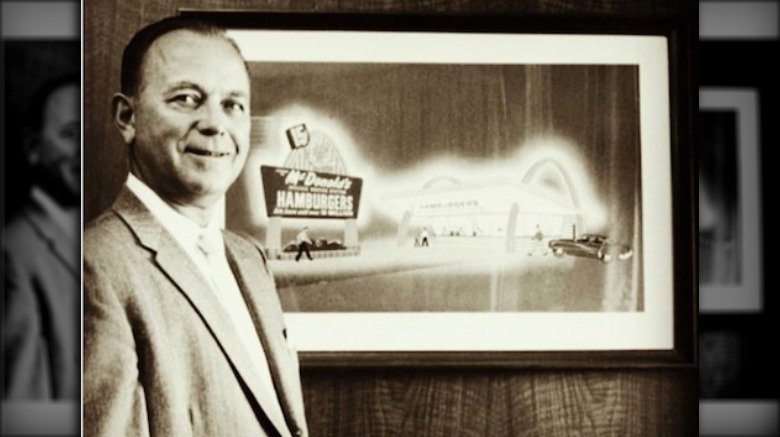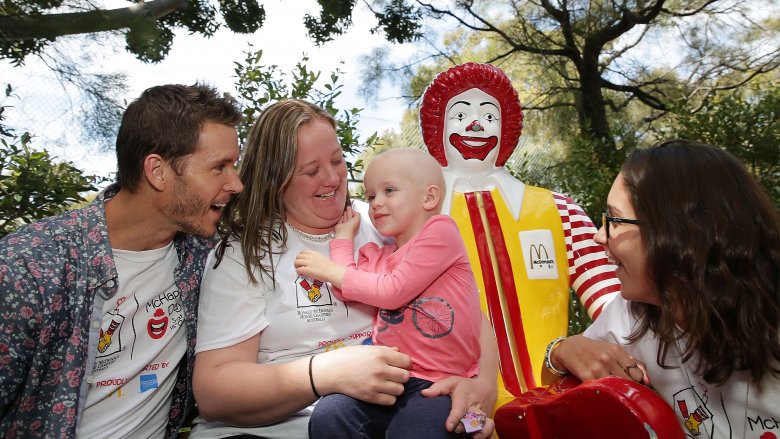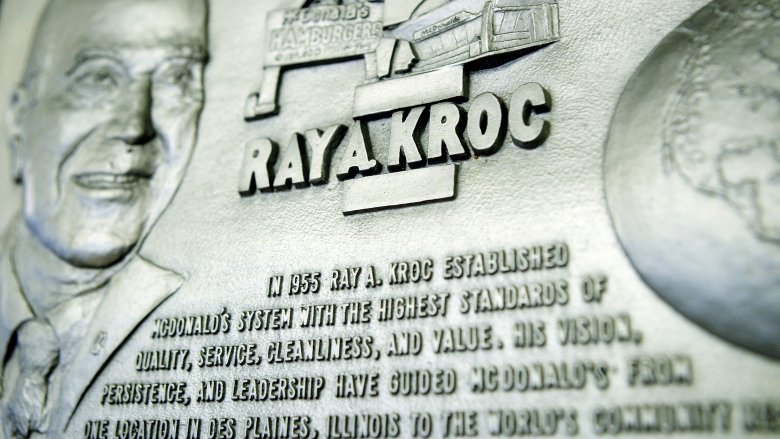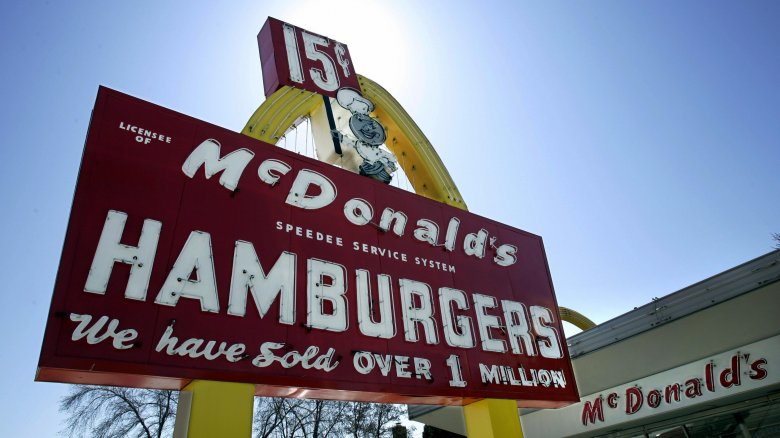The Truth About McDonald's Mogul Ray Kroc
The reason the world knows the name "McDonald's" isn't because of anyone actually named McDonald — although it was Dick and Mac McDonald who founded that first restaurant in California, built on the idea of super-fast, reliable service and a limited menu.
It was entrepreneur Ray Kroc who really recognized the potential the restaurant concept had, and he was the one who took the company to soaring heights after buying out the McDonald brothers. It's no secret he was relentless in his innovation and his drive, and according to McDonald's, it was largely what allowed them to sell their 100 millionth burger just three years after Kroc founded McDonald's System, Inc., a predecessor of the current corporation.
Kroc himself amassed a fortune, built on The Golden Arches that have been as controversial as they are famous. He did it all when he was 52 years old, once saying, "I was an overnight success alright, but 30 years is a long, long night." What else don't you know about this American entrepreneur?
He didn't have an easy start
Kroc definitely didn't grow up with a silver spoon in his mouth. According to Never Too Late To Be Great, Kroc's family emigrated to America from Bohemia. Kroc's father began his lifelong career at Western Union when he was just 13 years old, and like his father, Kroc himself never graduated high school.
By the time he dropped out as a teen, Entrepreneur says he simply had no interest — or patience — in organized schooling. Perhaps, because he already had a ton of practical business experience, having started a lemonade stand and worked in both a grocery store and a soda fountain. Eventually, he started working as a salesman for the Lily-Tulip Cup Co., a job that would eventually lead him to meet Earl Prince. Prince was the inventor of the milkshake mixing machine that Kroc was selling when he found himself on the doorstep of the McDonald brothers... but that's later in the tale.
First, a fascinating bit of trivia — especially for those who believe in fate. Kroc's career first in selling foodstuffs, then equipment, then finally building one of the largest fast food chains in the world seems to fulfill a prediction made by a phrenologist. Kroc's father took him to the fortune-teller when he was a child, and the phrenologist read the bumps on young Kroc's head and predicted a life in the food service industry. Go figure!
He served alongside an entertainment giant in WWI
Kroc was born in 1902, and that means he came of age during the first World War. According to Grinding It Out (via MousePlanet), he had been selling coffee beans door-to-door when the call to join military service became more important than anything else. His parents objected at first, but he said that even his grandmother finally supported his decision to lie about his age and join up. He entered the Red Cross and became an ambulance driver, where he met someone he described as being pretty weird.
He wrote, "In my company... there was another fellow who had lied about his age to get in. He was regarded as a strange duck, because whenever we had time off and went out on the town to chase girls, he stayed in camp drawing pictures. His name was Walt Disney."
Disney ended up going to France while Kroc didn't, but years later — in 1954 — Kroc reached out to Disney in hopes of securing a spot for his new restaurant franchise in Disney's new "Disneyland Development." Disney responded that he had passed along the request to the person in charge of concessions, but Kroc would claim he never got a response — and it was some time before McDonald's opened in Disney.
He was all about speed and efficiency
Most people think of burgers and fries when they think of McDonald's, but that's not what Kroc was most impressed by when he found himself walking up to a little San Bernardino restaurant called McDonald's. According to Entrepreneur, Kroc was selling milkshake machines at the time, and got an order for eight of them. That was staggering — each machine could mix 5 milkshakes at a time, and the idea that a restaurant was so busy they needed facilities for 40 shakes at a time was pretty shocking.
When he got there, he was equally shocked — and impressed — with what he saw. PBS says that the McDonald brothers had made their operation so efficient that they had no wait staff, no dishware, and were turning out burgers so fast it was mind-blowing. Their limited menu allowed them to do what they did very, very quickly, and Kroc wanted a piece of that.
And he got it.
He was inspired by some unlikely things
Brilliant ideas come about in a number of ways, but anyone who's ever had one of those, "Ah-ha!" moments knows just how exciting they can be. According to Inc., Kroc's inspiration to kick-start his empire came thanks to two very different things.
He was sitting in his car outside of that very first McDonald's, watching customers, when he saw one in particular that made his "pulse begin to hammer with excitement." She was a strawberry blonde woman, and she was driving a yellow convertible. It wasn't about the woman — not exactly — but it was about how happy she was with her hamburger that made him realize, in part, that there was something to this whole idea of super-fast food.
The other thing was a french fry. Kroc would write: "The french fry would become almost sacrosanct for me, its preparation a ritual to be followed almost religiously."
A woman in convertible and a tasty fry are two small things to base a business on, but there you have it. They gave rise to the eventual partnership between Kroc and the McDonald brothers, as well as the establishment of his guidelines for the proper fry, which meant not only strict guidelines placed on suppliers, but also regular spot checks to make sure his kitchens were using potatoes with the right percentage of water. Sure, that's bordering on obsession, but it's that obsession that means you can get the same Big Mac in New York City that you can get in Kansas, and that's nothing short of impressive.
When he put the McDonald brothers out of business
According to Entrepreneur, Kroc considered himself "not normally a vindictive man..."
But when it came to the McDonald brothers, he was downright vicious.
He opened his first McDonald's franchise in 1955, and used that location as a shining example of what other franchisees were buying into. But over the next few years, Kroc not only wasn't making any money, but he was arguing constantly with the brothers over changes he wanted to make. In 1961, he took a huge gamble — buying them out for $2.7 million. The deal happened, but there was one sticking point: Kroc thought it included their original location in San Bernardino, but they said it didn't.
The brothers kept their restaurant, but Kroc got the rights to their name. They were forced to rebrand as The Big M, but Kroc didn't want to let them have it at all. What's a businessman to do? He opened a McDonald's on the next block and put them out of business. He had told an employee: "... I'm going to get those sons-of-b****es," and he did.
When his lover's husband opened a franchise
Kroc's third wife was Joan Beverly Smith, and they were together until his death in 1984. She passed away in 2003 after giving away huge chunks of the McDonald's fortune to various charities, and their story is pretty incredible.
According to biographer Lisa Napoli (via MEL), they met in a piano bar in 1957. Both were married at the time, and they carried on their affair in secret for years. Along the way, Smith — who was working three jobs, including one as a singer at the piano bar — found herself moving to South Dakota with her husband and their child... thanks to Kroc.
Time says Kroc had convinced Joan's employer, Jim Zien, to get into the fast food franchise game. He did, and Joan's husband, Rollie, was hired to manage first a McDonald's in St. Louis Park, then the first McDonald's in South Dakota. Joan worked in the back office of the restaurant, and it would be more than a decade before she and Kroc made their relationship something less illicit.
He had some incredible relationship drama
Kroc's relationship with Joan Smith — who was the love of his life — was so incredible that reporter Lisa Napoli wrote an entire book about it: Ray & Joan, The Man Who Made the McDonald's Fortune and the Woman Who Gave it All Away. She told MEL that it was filled with drama from the beginning, and that there was a time — a few years after they met — when they were ready to run off to Vegas for a quick divorce from their then-spouses, when she bailed on him and returned to her husband and child.
No one was clear as to what had happened, but Kroc went on to marry another beautiful blonde, a woman named June. That relationship ended after a chance meeting with Smith years later, and Kroc left June the night before they were due to leave on a cruise celebrating their 5th anniversary.
It was 12 years after the start of their relationship before Kroc married Joan, and during that marriage, there were divorce filings, restraining orders, accusations of "extreme mental cruelty," and at one point, he was forbidden from even returning to the apartment they shared. They fought in front of friends and associates alike, but Napoli says she truly believed that in spite of all the fighting and the drama, "... this was a long passion and a deep passion. I really feel like they had this ineffable connection that's impossible to even describe..."
He had numerous health problems
McDonald's might be blamed for a huge number of health problems, but Kroc had his own fair share of difficulties.
He was looking back at the time he was getting ready to kick off his McDonald's business venture, and wrote in Grinding It Out (via The Atlantic), "I was 52 years old. I had diabetes and incipient arthritis. I had lost my gall bladder and most of my thyroid gland in earlier campaigns. But I was convinced that the best was ahead of me."
And no matter what you think of Kroc, that's pretty inspirational. He's proof that you're never, ever too old to start a new endeavor, and you never know where it's going to lead you. Because he was right: the best was, indeed, ahead of him. Between the age of 52 and his death due to heart failure on January 14, 1984, Biography says he saw McDonald's grow to 7,500 restaurants and a worth of $8 billion. Kroc himself was worth around $500 million.
Some of his charities were tied to personal tragedy
The Krocs gave millions to charity, but two of the organizations they founded themselves were born from personal tragedy.
In 1965, Kroc started the Kroc Foundation to fund research into diabetes, arthritis, and multiple sclerosis. SNAC says that before the foundation was disbanded the year after his death, it had not only sponsored a series of conventions and publications, but it had also awarded more than 1,600 research grants to various universities and established numerous endowments. According to the University of New Hampshire, part of the foundation's funding was going to research into the disease — diabetes — that ultimately took the life of his daughter, Marilyn, in 1973.
In 1971, Joan Kroc founded Operation Cork — which Time says was "Kroc" spelled backwards. Struggling to deal with her husband's "violent, ungovernable temper," she channeled her energies into the charity that dealt with alcohol addiction. She held conferences that brought together professionals from across the field, pushed for updating medical curriculums, and even funded TV dramas to reach people who were struggling. Later, she would help fund the Betty Ford Clinic.
The insights and the slogan he built an empire with
According to McDonald's, Kroc's driving principles were exemplified by one of his favorite phrases: "Quality, Service, Cleanliness, and Value", and he said, "If I had a brick for every time I've repeated the phrase... I think I'd probably be able to bridge the Atlantic Ocean with them." Those were the words that embodied how he wanted to do business. But there was more to it, too, and he also believed in what he called the principle of the three-legged stool.
McDonald's says that Kroc's vision for the company wasn't one that involved the employees on the bottom of the pyramid and a handful of executives at the top. Instead, he sold McDonald's as a vision where franchisees and suppliers would start "working not for McDonald's but for themselves, together with McDonald's." He illustrated the point by using the example of a three-legged stool. One leg was the franchisees, one was the suppliers, and one was the employees. The stool wouldn't work without all three of them, and it was only as strong as each one of the legs.
Strengthening that stool was one of the reasons he founded Hamburger University in 1961, a training program that taught franchisees everything they needed to know to be a part of the well-oiled McDonald's machine. As of 2019, more than 275,000 people have gone through Kroc's program.
He saved a baseball team, then almost made them quit
The San Diego Union-Tribune ran an article with the headline, "Ray Kroc saved the Padres," and that's not an exaggeration. In 1973, the Padres were having some serious problems both on the field and at the bank. At the end of the season, they were due to move to Washington, D.C., and they may have — if it wasn't for Kroc, who attended a lunch where he bought the team for around $12 million.
During Opening Night in 1974, Kroc addressed the stadium with words that included this gem that sort of set the tone for his management style: "Fans, I suffer with you. I've never seen such stupid ballplaying in my life."
Or, something along those lines. Mental Floss says his exact words were lost, because that was the same time a streaker decided to take the field (and it was the same night Hank Aaron broke Babe Ruth's home run record). His comments so offended the Padres that the players talked about boycotting, and the Padres hit back — with the help of the Astros. After the Astros' Doug Rader made a comment to the effect that they weren't the short-order cooks Kroc was used to dealing with, the first game of the Padres' next home series was decreed Short-Order Cooks Night. Rader even played in a chef's hat and apron.
Just months after Kroc passed away, the Padres went to the World Series for the first time.
From hero to villain
Today, Ray Kroc is viewed as one of fast food's villains. Sure, he was a visionary who revolutionized the industry, but he also stepped on the McDonald brothers — the real visionaries who created the entire concept — to make a fortune. CBS News spoke to Dick McDonald's grandson, Jason McDonald French, and asked just what they thought of Kroc. French replied, "Ray Kroc was kind of a touchy subject."
That's putting it mildly, and here's the weird thing: he's only seen that way in hindsight. Contemporary reports of Kroc are much, much different, says The Atlantic, and notes that not only did Esquire once name him to a list of 50 people who made invaluable contributions to American life in the 20th century (a list that also included Martin Luther King, Jr.), but Time called him one of the 100 most important people of the 20th century in their 1998 retrospective.
He was once a symbol of the American dream, but that's shifted drastically (thanks, in part, to the movie The Founder, which didn't exactly paint him in the prettiest light) — and it just goes to show how completely opinions of one person's lifelong work can change.
